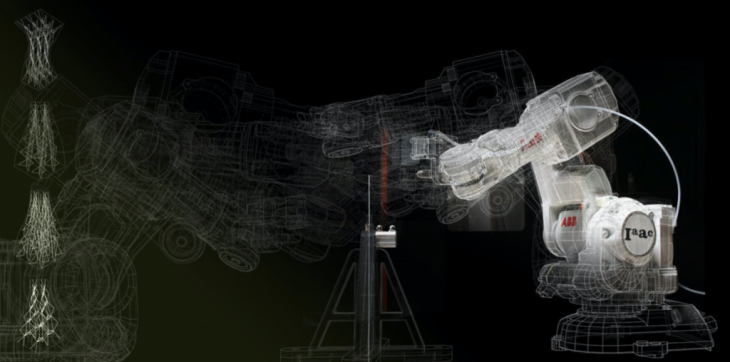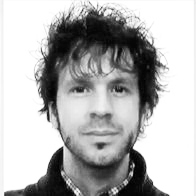ROBOTIC FABRICATION
Faculty: Alexandre Dubor & Ricardo Mayor
 Credits: MAA01 Robotic Fabrication Seminar, 2018/19
Credits: MAA01 Robotic Fabrication Seminar, 2018/19
The construction sector has not yet taken full advantage of the digital revolution that is happening in other manufacturing sectors, such as in the automobile and aerospatial engineering industries. While studies predict that Automation, Robotics, and AI will possibly increase productivity by 60% in the construction sector, they also open new opportunities for design and for increased building performance.
In this context, a community of research and education centers including IAAC is exploring new fabrication methods that can be more efficient, sustainable, and customisable thanks to the use of relatively accessible and flexible industrial robotic arms. Architect and Designer full control of these precise and productive tools open new opportunities to design and invent new material tectonics that can be easily scaled at building dimensions.
In this seminar, students are offered the opportunity to learn and explore a robotic fabrication within IAAC’s particularly open environment for direct manipulation and testing. In parallel, students are encouraged to develop a design protocol suitable for robotic fabrication that could serve to envision an application at architectural scale.
The seminar will conclude with a robotically fabricated prototype fabrication, together with a video of the design process, the prototype fabrication and the envisioned architecture.
Learning Objectives
At course completion the student will:
- have an overview of the possible robotic fabrication processes available for architects and designers;
- understand the basics of robotic kinematics, robotic simulation and robotic control;
- be capable of generating the robotic simulation and production files to produce a prototype;
- be capable of integrating the limitations and opportunities of a specific robotics process into a final architecture design.
Faculty

Alexandre Dubor is an architect and researcher combining new technologies in an attempt to improve how we build and live in our cities. He holds a Master degree of Architecture & Engineering from EAVT & ENPC (France) and a Master Degree in Advanced Architecture from IAAC (Spain), with a specialization in robotic fabrication and large-scale additive manufacturing (FabBot 3.0).
He holds as well a French architectural licence (HMONP) and has worked in various architectural offices from competition stage to delivery (Libeskind, Atenastudio, iDonati, AREP) while exploring the potential of scripting and coding in a separate practice (Collectif277). Since 2012, he is working at IAAC as an expert in digital and robotic fabrication. He is now leading the Open Thesis Fabrication programme as well as the Master in Robotic and Advanced Construction at IAAC.
Together with IAAC staff, students and industrial partners, he is investigating how new advances in material, digital fabrication and computational design could lead to a better construction ecosystem, towards a more efficient, affordable, sustainable and personalised built environment.

Ricardo Mayor is a Master in Architecture Superior Technical School of Architecture of Alcalá de Henares in Madrid.
He graduated in 2012, obtaining a prize for his academic results and a further one for his final project. Since then he is one of the four founders of Design of Architectural Territories – DAT Pangea – who was awarded the first prize for the Best Young Architects in Europe for their Sustainable construction by LafargeHolcim Foundation.
His working career has been mainly developed in architectural and engineering offices in Madrid, Ljubljana, Barcelona and Paris, taking part to internationally recognized projects with international architects as Frank Ghery, OMA, Jean Nouvel or Kengo Kuma.
His main research faces themes such as design, fabrication and politics, focusing in particular on social issues to suitable solutions, and he implements them through his professional and academic practice.